WEAPONS TRADE
Protesters call for ‘horrendous’ arms fair in London to be shut down
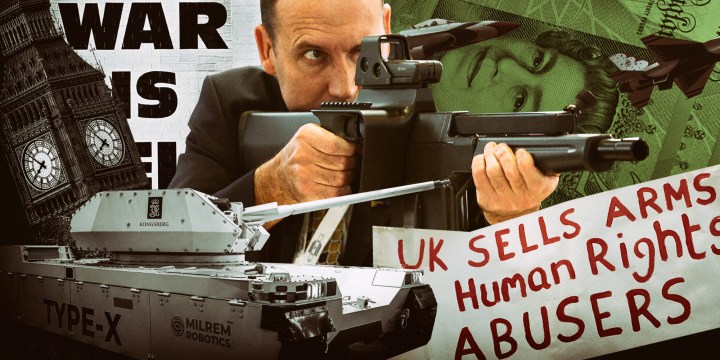
Controversial arms fair Defence and Security Equipment International got under way in London on Tuesday and runs until 15 September. From rocket launchers, tanks and helicopters, to missiles, sniper rifles and the latest surveillance technology, it’s a bizarre performative affair that sees the biggest corporate arms dealers rub shoulders with delegates from some of the most repressive regimes in the world, including Saudi Arabia, Turkey, Bahrain, Qatar and Israel.
About 200 people gathered outside ExCeL London on the eve of the Defence and Security Equipment International (DSEI) arms fair and observed an hour of silence for those whose lives have been destroyed by war and conflict.
A six-metre sign read, “War Stops Here”. Other smaller placards calling out the arms trade were scattered about.
“The idea of an arms fair is absolutely obscene and the fact that my capital city holds the biggest one in the world, I find that shameful,” said Christina Downe (76).
“We want peace, we don’t want war… the massive profits people make from making and selling arms is what drives war.”
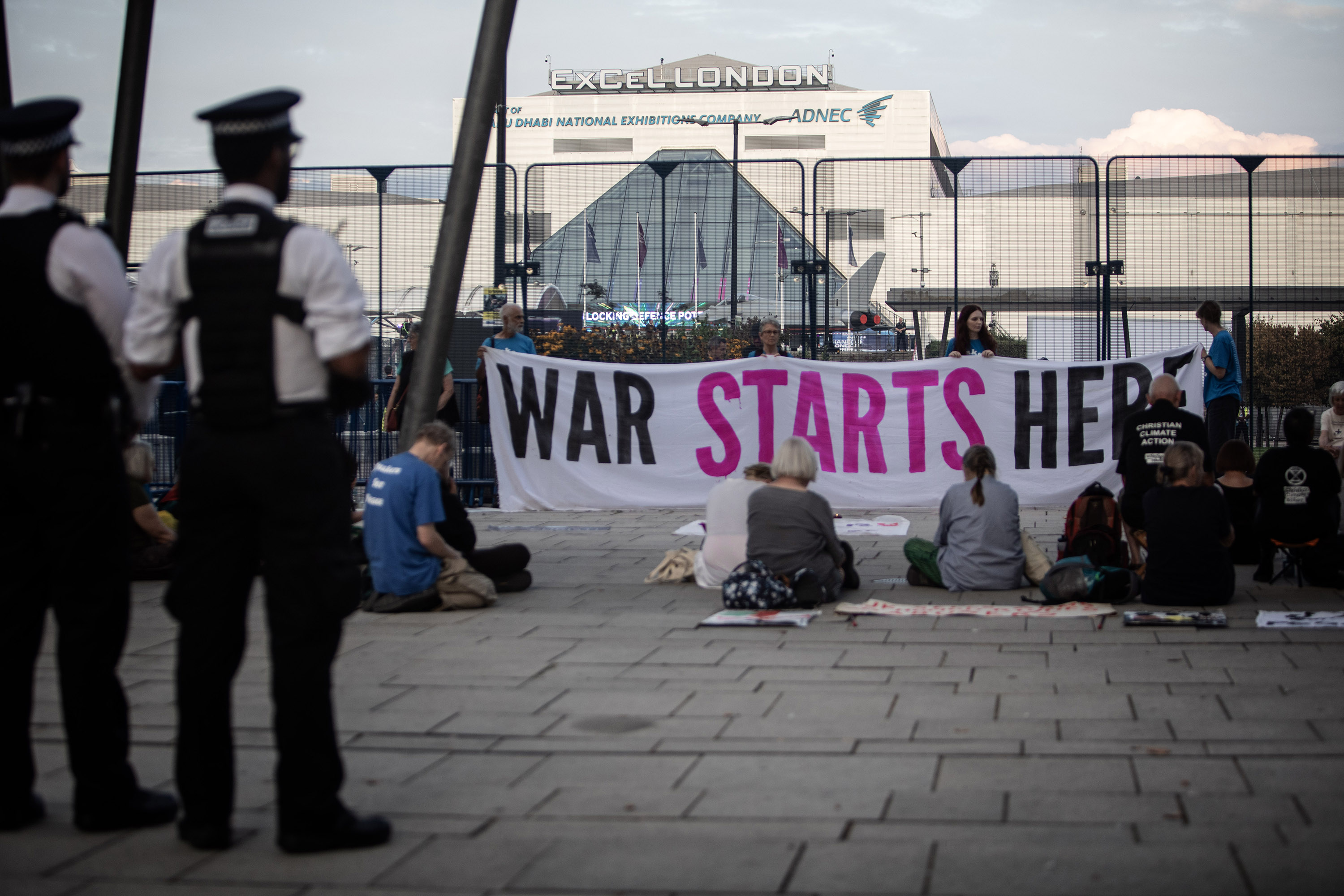
Police keep watch over protesters and activists during the silent candlelit vigil in solidarity with victims of conflict, war and the arms trade on the eve of the opening of the Defence and Security Equipment International arms fair in London on 11 September 2023. (Photo: Leila Dougan)
Military expenditure across the world has reached new record highs, and with the war in Ukraine showing no signs of slowing down, Europe has seen its steepest increase in military spending since the Cold War.
The Stockholm International Peace Research Institute (Sipri) has reported that world military spending grew in 2022 to an all-time high of $2.2-trillion, with Russia’s military spending seeing a sharp rise and Ukraine’s military spending peaking at $44-billion, up 640%.
Dr Diego Lopes da Silva, senior researcher with Sipri’s military expenditure and arms production programme, says the war in Ukraine has had an “immediate impact on military spending decisions in Central and Western Europe” and this will lead to a rise in military expenditure over the coming years.
But even in states that are experiencing peacetime, governments are throwing money at securitisation.
According to a press release by the Campaign for Nuclear Disarmament, the UK spends 2.5% of its GDP on weapons and warfare, despite the cost-of-living crisis, inflation and soaring food prices that are seeing many having to dig into their savings or live off credit to make ends meet.
South Africans can relate. While poverty and the eradication of gross inequality should be the absolute priority of government, military spending came to $2.8-billion in the past financial year. But that’s peanuts compared with the big boys.
The US is by far the biggest military spender, according to Statista. In 2022 an eye-watering $877-billion was dedicated to military spending. China ($292-billion) and Russia ($86-billion) are in second and third place. The top 15 countries account for more than 80% of global military spending.
Fair of immiseration
“The extraordinary thing about the fair is that it brings together these military luminaries, huge numbers of corporate executives looking very smart in their suits and a significant number of arms dealers, and they all look and behave as though they’re regular members of society,” says global weapons expert and former South African ANC MP Andrew Feinstein.
“But the entire thing is actually focused on creating immiseration and often death for millions of people around the world.”
“Here they all are, in the docklands in London, behaving as though this is a great purpose and this is something that London should be proud to host. But these people are almost sociopathic in their complete inability to understand why there are so many who protest about the very existence of this fair… who protest about the fact that these people are allowed to gather as though they’re doing great good in the world, when in fact they’re the cause of such immense suffering in the world,” says Feinstein.
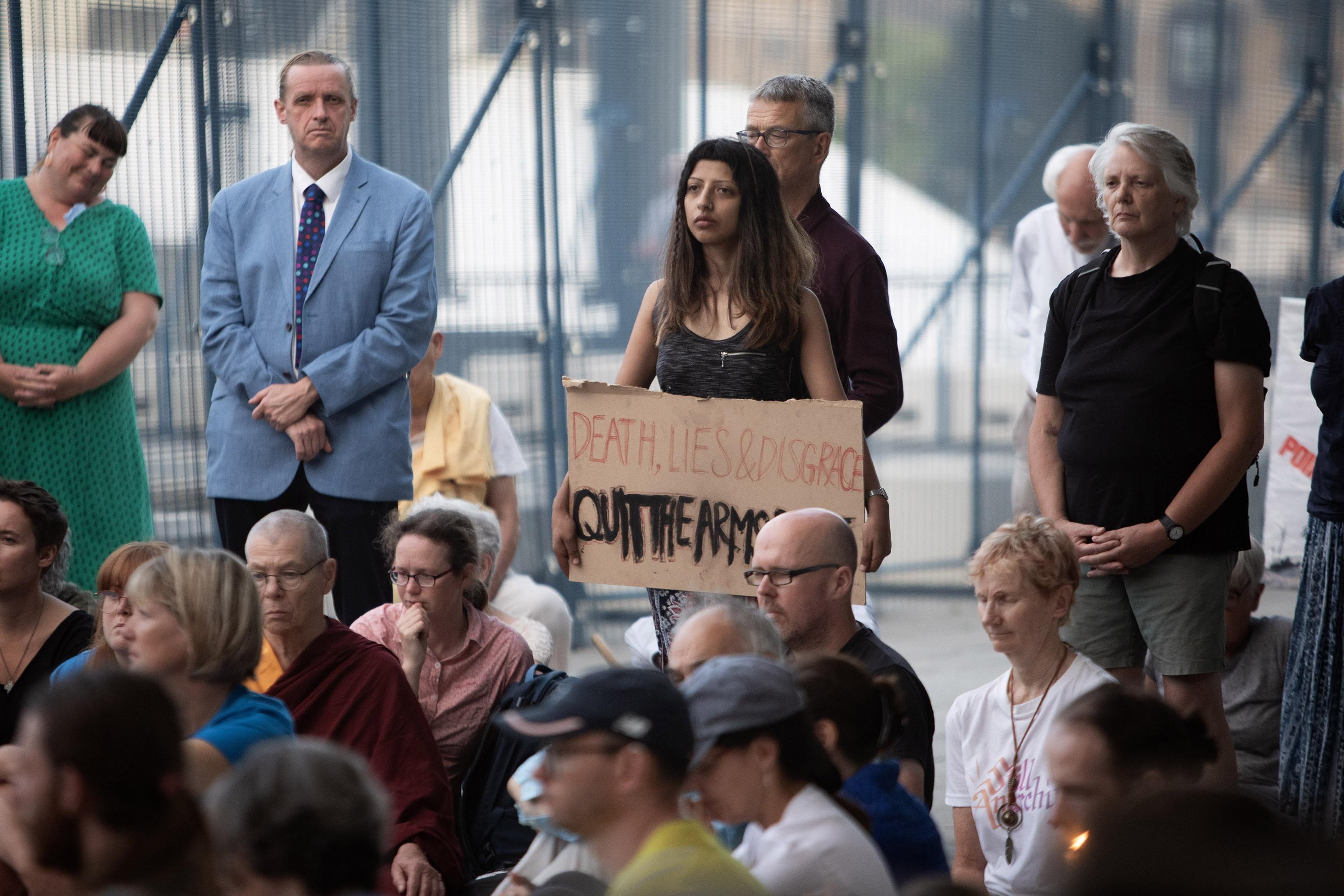
About 200 people gathered outside the venue of the DSEI and observed an hour of silence. (Photo: Leila Dougan)
“We see in so many aspects of everyday life what C. Wright Mills described as the militarist mindset. Where the world is perceived through a military lens so that we have very little interest in making peace,” says Feinstein.
“And the fact that we’re spending more than ever before on our militaries, on so-called defence, is a complete indictment of how the world is structured and governed.”
Read more in Daily Maverick: ‘Nothing to hide here’: Inside the world’s largest arms fair in the heart of London
The arms fair is backed by the UK Ministry of Defence and UK Defence and Security Exports which falls under the Department for International Trade. UK corporate BAE Systems is the UK’s largest arms company and produces the likes of submarines, fighter jets and combat vehicles.
In 2022, the revenue of BAE Systems amounted to £21.3-billion.
“Our global footprint, deep customer relationships and leading technologies enable us to effectively support the national security requirements and multi-domain ambitions of our government customers in an increasingly uncertain world,” said chief executive Charles Woodburn at the announcement of the company’s 2023 half-year results.
South Africa is a small but important player in the global arms trade.
Director at the African Defence Review, Darren Olivier, says South African arms companies are sure to be on the lookout for clients at the fair, and while the industry does not produce full vehicles, tanks or aircraft, it does manufacture components that are part of larger supply chains.
He says South Africa’s biggest markets traditionally are the Middle East, Europe and Asia. In 2022, South Africa exported about R1.6-billion worth of artillery shells to Australia. Another large order was R940-million worth of mortars that went to Germany.
On the African continent, armoured vehicles tend to do well, with R400-million worth of vehicles exported to Congo, Ghana, Guinea, Mali, Niger, Senegal and Zambia. Artillery manufactured in South Africa was exported to Djibouti, Egypt and Uganda.
“We typically don’t sell small arms and ammunition because many African forces tend to use former Eastern Bloc weaponry, and we rarely produce for that range,” says Olivier.
The South African defence industry is riddled with challenges. The approval of export permits is one of the major obstacles for small South African arms companies, says Olivier. And because the national defence budget has plummeted over the past 30 years, it’s almost impossible for any company in South Africa to make a profit if it relies solely on orders from the national defence force.
“If you want to survive, you have to export,” says Olivier.
But there’s another aspect. The industry is continuing to suffer heavy financial losses in the aftermath of State Capture, with state-owned arms dealer Denel skipping payments to suppliers and even staff after being hollowed out by corruption.
Feinstein’s not surprised. He says corruption is built into the economics of the arms trade and mentions the controversial docking of the Russian ship Lady R in Simon’s Town, which continues to make headlines.
“We still don’t know what has gone on there, and we have a right to know because all of these things are being done in our name with our money,” he says.
Feinstein is a former ANC MP who resigned from Parliament in 2001 following the government’s refusal to allow an independent inquiry into the multimillion-rand arms deal, which saw politicians, officials and military leaders paid millions of dollars in bribes in the early years of South Africa’s democracy.
Shadow World Investigations estimates that the cost of that arms deal is equal to R142-billion in 2020 rand terms.
“We have been a victim, as South Africans, of the way in which the arms trade operates globally. And DSEI is the polished, PR pearl of the global arms trade. So we should see it as a reflection of and representative of that which spoiled our young democracy,” says Feinstein.
“The reality is that the corruption in the global arms trade oils the wheels of our political systems. War-making is an enormously profitable business and it’s why we describe the trade as a business that counts its profits in the billions and doesn’t count its losses which are in human lives,” says Feinstein.
Masters of War
The arms fair takes place behind heavy security and police lines, and even though civil society has been protesting in the lead-up to the event, activists are deeply concerned about repressive UK laws that aim to curb dissent.
The Public Order Bill was passed in the UK on 2 May 2023 and is raising alarm from activists and human rights groups, including Amnesty International and the United Nations Human Rights Council.
The Campaign Against Arms Trade is a UK-based organisation that works to end international trade in weapons. According to the campaign’s media coordinator, Emily Apple, by Friday, 8 September, nine campaigners had been arrested after blocking the road to DSEI.
She says demonstrators in the UK are being closely watched, more arrests are taking place and intelligence is being gathered on activists and campaigners, including environmentalists and those working towards the abolition of the global arms trade.
“Clearly the police see the recent updates to the law as an opportunity to harass and bully protesters. Nevertheless, protest is an important right in this country, and people must continue to make their voice heard on important issues, not least on the terrible consequences of the trade in weapons,” says Apple
It’s a clear case of freedom of speech under threat, according to Feinstein.
“Police can now stop a protest if anyone complains that a protest is too noisy. Police can decide that a protest is too disruptive and therefore stop it. They have far greater powers to arrest those who are protesting and who cause any form of disruption, which is left to the police to interpret and determine,” he says.
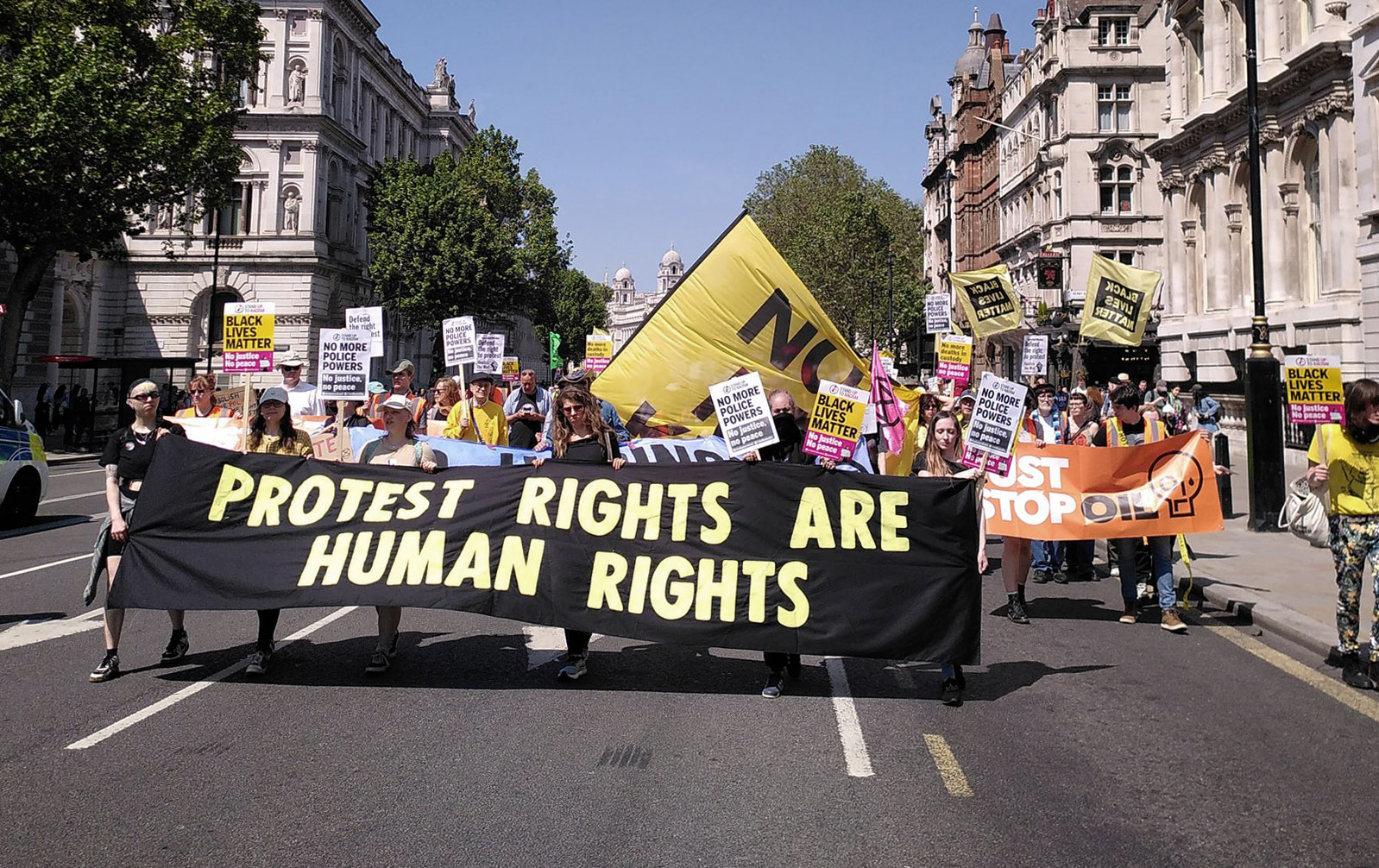
Activists in London protest against the Public Order Bill on 27 May 2023. (Photo: Twitter / @londoncaat)
“We’re seeing a closing of the political space in the UK and the first victim of that is the closing down of the right to protest and the right to free political speech. And it’s a terrifying development,” he says.
Olivier has a different view.
“It’s good to have activism to remind us that we need to keep a close eye on the industry, but I think attempts to have DSEI shut down is misguided,” says Olivier.
“Countries have a need and a right to defend themselves. When you lose sight of that and believe that you can solve everything through pacifism, I don’t think that’s realistic,” says Olivier.
“We would all love to live in a world where there is no need for defence forces and defence spending, but it’s just not feasible. From that point of view, as long as you have a legitimate need for countries to have militaries and equipment, you’re going to need an arms trade,” he says.
Export controls play an important role and civil society should have a say in what is acceptable for their countries to export and who can be on the receiving end of weapons manufactured in their country, according to Olivier.
“If you believe that countries should not export to Russia, then that should be incorporated into the arms export process. I don’t think it’s realistic to expect that the industry is going to self-police,” he says.
“Militaries are going to need to buy equipment and closing down a defence show is not going to stop that… I don’t think it’s realistic to stop the arms trade or exhibitions like DSEI, and if we did do so, the majority of businesses would just migrate somewhere with less visibility,” he says.
Rajan Naidu (72), an activist who joined the silent vigil, advocates for new solutions to conflict that work towards global justice.
“What Israel is doing to the Palestinian people; what the Saudis are doing to their brothers and sisters in Yemen, it’s all because of money. We don’t want people to have so much money that they corrupt our governments and our media and dominate our understanding of what’s happening in the world,” he says.
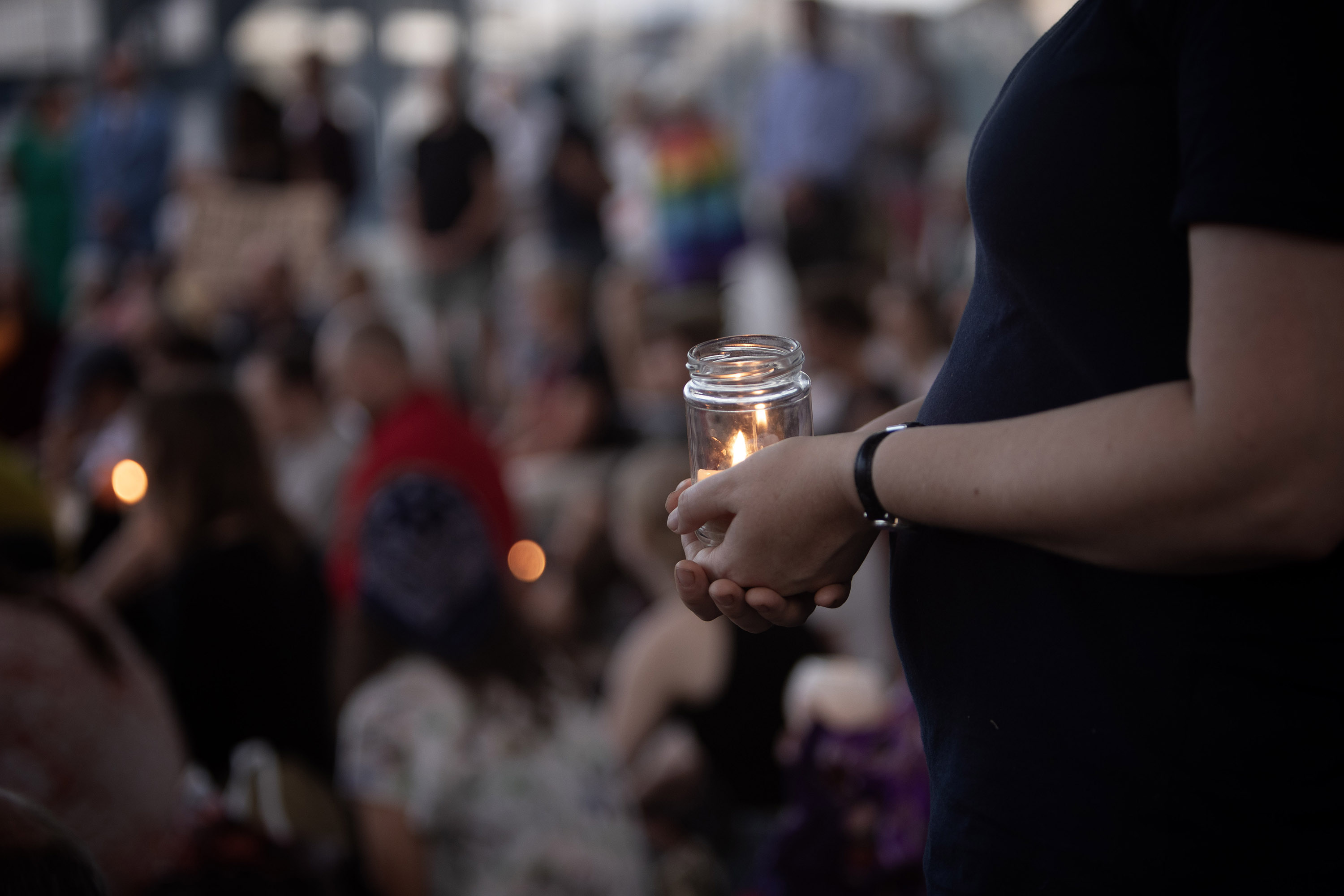
On average, 100 civilians are killed in armed conflicts each day, according to the United Nations. Peace activists in the United Kingdom want to draw attention to the plight of those living in regions torn apart by war and conflict. (Photo: Leila Dougan)
Cath Attlee (66) says awareness needs to be raised in developed nations because ordinary people are unaware of the consequences of the weapons industry.
“We spend millions of pounds on weapons which could go to other issues like poverty or the climate crisis. The UK not only hosts this horrendous arms exhibition, but is a major manufacturer and exporter of weapons.
“We don’t care who we sell them to. Our adherence to human rights principles goes completely out the window,” she says.
“In terms of immigration, one of the reasons so many people want to leave their countries is because they’re being bombed and conflict is driving them out. People in the UK don’t seem to get that at all. Our weapons are causing people to leave their homes,” says Attlee.
“I believe in peace and I believe in justice. We need to be using diplomacy and compassion and kindness,” says Naidu.
“What we’re doing as non-violent civil resisters here tonight is small, but we’re going to keep doing it.” DM



















 Become an Insider
Become an Insider
Comments - Please login in order to comment.